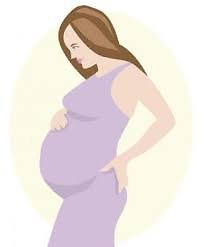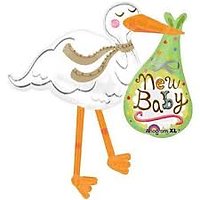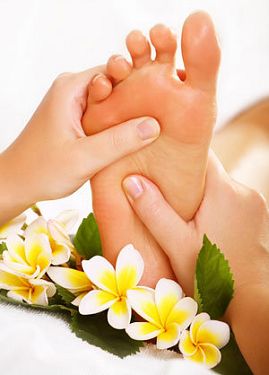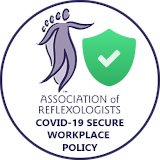Maternity Reflexology
There are several reasons why women choose to have reflexology during pregnancy. It can reduce stress, and induce relaxation. It can ease symptoms that arise in the first, second, and third trimesters, and in the run up to labour (37+ weeks), can assist in lowering anxiety, and encourage a natural birth. In fact, research by Kalder et al. (2010) found pregnant women were not at all concerned about any adverse effects from reflexology, but found it beneficial to both themselves and also their baby.
Reflexology can provide quality time for the mum-to-be, whereby she can focus entirely on herself and her unborn baby, and your reflexologist can provide a listening ear, and/or general lifestyle advice.
Further research has highlighted that reflexology can assist in reducing the following symptoms that arise throughout pregnancy:
First trimester
Fatigue – in the first twelve weeks of pregnancy blood supply increases in order to transport more nutrients to the developing foetus, reducing blood pressure, as well as blood sugar. Therefore, it is quite common to feel tired/exhausted; it is a signal from your body to slow down while it adapts to the internal changes taking place. Results from a recent randomised clinical trial by Shobeiri et al. (2017), demonstrated that there was a significant reduction in the severity of fatigue after the intervention of reflexology.
Second trimester
Constipation – during pregnancy, an increase in the hormone progesterone causes relaxation of smooth muscle in the body, which includes the intestine, thus slowing peristalsis and therefore digestion. A recent study by Sehhatti et al. (2020) showed ninety-seven percent of women reported an improvement in constipation after six weeks of regular reflexology.
Heartburn - arises when the cardiac sphincter in the upper part of the stomach, which opens and closes as a normal part of digestion, fails to close completely, resulting in gastric acid or food escaping from the stomach back up into the oesophagus. In pregnancy, this can again stem from the hormone progesterone causing smooth muscle tissue to relax, or it may be as a result of pressure on the stomach from the growing foetus. (From an emotional aspect, Stormer (1995, p178) suggests heartburn is a result of ‘extreme anxiety and gripping fear at the possibility of not coping or meeting expectations', which may correlate with one's thoughts when pondering the ‘new arrival’.) Reflexology, when applied to areas of the feet corresponding to digestive, central nervous, and endocrine systems, is thought to flush through toxic substances, release subconscious burdens, and calm the mind, thereby assisting the body's digestive components to function more efficiently (Norman, 1988).
Third trimester
Pelvic girdle pain - With the growing baby and release of the hormone ‘relaxin’, from the ovary and placenta, ligaments in the pelvic area soften and the cervix widens, resulting in joints in the pelvic area being prone to movement, or moving unevenly, resulting in less stability, and possible pain. Reflexology has been found to have positive benefits for pre-natal women in reducing both lower back, and pelvic girdle pain (Hughes, et al., 2018).
Oedema – can occur in the feet and ankles due to an accumulation of fluid in the tissues as a result of the body producing more blood and bodily fluids to aid the developing foetus. One study by Mollart (2003) highlighted that a large percentage of women who received reflexology incorporating lymphatic drainage technique noticed reduced swelling and tightness in their feet after a treatment.
Stress - It is natural to feel anxious and stressed when pregnant. Studies suggest that a significant proportion of pregnant women suffer from pre-natal anxiety, both in general, and regarding their pregnancy. This pregnancy-specific anxiety has been defined as the concerns and fears about pregnancy, childbirth, infant health, and future parenting (Huizink, et al., 2004). Additionally, anxiety during pregnancy has been associated with a shorter gestation period and lower birth weight, both of which have potential to affect infant development (Kinsella and Monk, 2009). On a positive note, results of a study by Omara et al. (2018) concluded that foot reflexology is an effective treatment for pregnant women suffering from both stress and anxiety during the third trimester of pregnancy.
Preparing for labour (37+ weeks)
Pain - Reflexology has been used by some women to reduce pain during labour. A randomized controlled study carried out by Dolatian et al. (2011) on women due to give birth for the first time, showed regular reflexology on the run up to labour reduced pain considerably in all three phases of cervical dilation, in comparison to those who received only emotional support, and/or routine neonatal care.
Anxiety - Additionally, a study by Erkek and Aktas (2018), found that reflexology in the final weeks had a positive effect in reducing total anxiety scores of women in labour, and was seen as a non-invasive and economical method to reduce complications. The study concluded reduced anxiety in labour promoted not only a positive birth experience, but encouraged secure attachment between mother and infant, and was a protection factor against post-natal mental ill-health.
Post-natal
Reflexology can also be of benefit post-natal, when sleep deprivation may occur. A randomised controlled trial by Li et al. (2011), showed that the intervention of foot reflexology in the post-partum stage of pregnancy significantly improved quality of sleep.
Fertility
It is considered, regular reflexology, in conjunction with positive nutrition and lifestyle changes, can be especially beneficial in assisting with fertility problems; it is believed reflexology can help restore hormonal balance, regulate menstrual cycle and relieve the anxiety associated with trying to get pregnant (AOR, 2012).
Reflexology is also considered helpful in preparing the body for in vitro fertilisation (IVF) treatment, by assisting detoxification, balancing hormones, and inducing relaxation (Balliu, 2016).
References
Association of Reflexologists (2012) ‘Reflexology support for fertility’ [Online] Available at: https://www.youtube.com/watch?v=AWa0a6yeRMk
Balliu, R. (2016) ‘Case study: reflexology supports client prior to IVF’ [Online] Available at: https://www.fht.org.uk/fs/s/v/rr_article_ruth_balliu_sharing_zone_0.pdf
Dolatian, M., Hasanpour, A., Montazeri, S.H., Heshmat, R. and Majd, H.A. (2011). ‘The effect of reflexology on pain intensity and duration of labor on primiparas’, Iranian Red Crescent Medical Journal, Iran, Iranian Hospital Dubai, Vol. 13, No. 7, p.475-479. [Online] Available at: https://www.ncbi.nlm.nih.gov/pmc/articles/PMC3371987
Erkek, Z. Y. and Aktas, S. (2018) ‘The effect of foot reflexology on the anxiety levels of women in labor’, The Journal of Alternative and Complementary Medicine, Vol. 24, No. 4, pp.352-360. [Online] Available at: https://doi.org/10.1089/acm.2017.0263
Huizink, A. C., Mulder, E. J. H., Robles de Medina, P. G., Vissesr, G. H. A., and Buitelaar, J. K. (2004) ‘Is pregnancy anxiety a distinctive syndrome?’, Early Human Development, Ireland: Elsevier Ireland Ltd, Vol. 79, No. 2, pp. 81–91. [Online] Available at: https://doi.org/10.1016/j.earlhumdev.2004.04.014
Kalder, M., Knoblauch, K., Hrgovic, I., and Munstedt, K. (2010) ‘Use of complementary and alternative medicine during pregnancy and delivery’, Archives of Gynaecology and Obstetrics, Vol. 283, No. 3, pp 475-482. [Online] Available at: https://DOI.org/10.1007/s00404-010-1388-2
Kinsella, M.T. and Monk, C. (2009) ‘Impact of maternal stress, depression & anxiety on fetal neurobehavioral development’, Clinical Obstetrics and Gynecology, Vol. 52, No. 3, p. 425. [Online] Available at: https://doi.org/10.1097/GRF.0b013e3181b52df1
Li, C-Y., Chen, S-C., Li, C-Y., Gau, M-L., and Huang, C-M. (2011) ‘Randomised controlled trial of the effectiveness of using foot reflexology to improve quality of sleep amongst Taiwanese postpartum women’, Midwifery, Scotland: Elsevier Ltd, Vol. 27, No. 2, pp. 181–186. [Online] Available at: https://doi.org/10.1016/j.midw.2009.04.005
Mollart, L. (2003) ‘Single-blind trial addressing the differential effects of two reflexology techniques versus rest, on ankle and foot oedema in late pregnancy’, Therapies in Nursing and Midwifery, Scotland: Elsevier Ltd, Vol. 9, No. 4, pp. 203–208. [Online] Available at: https://doi.org/10.1016/S1353-6117(03)00054-4
Norman, L. (1988) The Reflexology Handbook: A Complete Guide, London, Judy Piatkus (Publishers) Ltd
Omara, H. M., Eman, S. E. F., Mohamed, F. A. E. E. and Ghada, E. (2018) 'Effect of Foot Reflexology on Stress and Anxiety during Pregnancy', The Medical Journal of Cairo University, Vol. 86, No 3, pp.1607-1611. [Online] Available at: https://journals.ekb.eg/article_56366_b92dd313ef990cec6ac93fe942d2dc84.pdf
Sehhatti, F., Hughes, C., Mirghafourvand, M. and Azan, Z.A., (2020) ‘The effect of short-term foot reflexology in improving constipation symptoms during pregnancy: A two-armed, randomized controlled trial’, International Journal of Women's Health and Reproduction Sciences, Vol. 8, No. 1, p. 4726. [Online] Available at: https://pure.ulster.ac.uk/en/publications/the-effect-of-short-term-foot-reflexology-in-improving-constipati
Shobeiri, F., Manoucheri, B., Parsa, P. and Roshanaei G. (2017) 'Effects of Counselling and Sole Reflexology on Fatigue in Pregnant Women: A Randomized Clinical Trial', Journal of Clinical and Diagnostic Research, India: JCDR Research and Publications Limited, Vol. 11, No. 6, pp. QC01–QC04. [Online] Available at: https://doi.org/10.7860/JCDR/2017/22681.9972
Stormer, C. (1995, p178) Reflexology: The Definitive Guide, London, Hodder & Stoughton
Relax, Rebalance, Re-energise...





